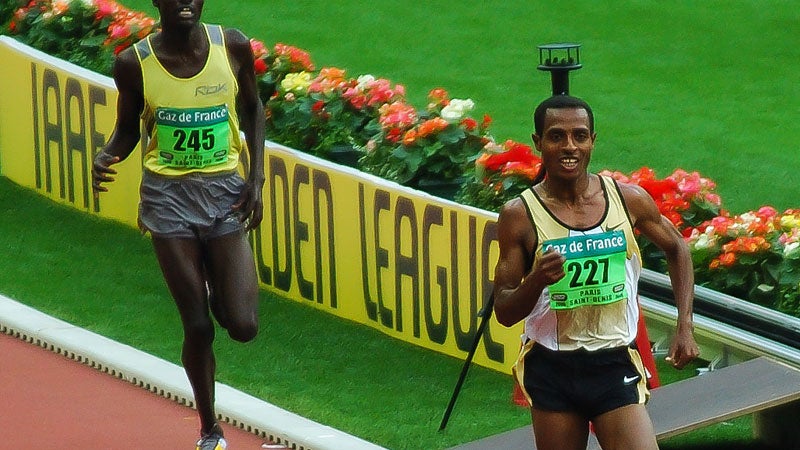Great track runners don’t always make great marathoners, but on Sunday, 31-year-old Ethiopian Kenenisa Bekele won the Paris Marathon in 2:05:03, which makes him one of the fastest first-time marathoners in history. Bekele is the world record holder at 5,000 (12:37) and 10,000 meters (26:17), and suddenly he looks like an odds-on contender to take a crack at the current world marathon record, 2:03:23, held by Kenya’s Wilson Kipsang.
Track fans have been speculating about Bekele’s move to the marathon for at least a decade, ever since he broke Haile Gebrselassie’s 5,000 and 10,000 world records, won his first of nine world and Olympic titles, and compelled Geb to move up to the marathon. After a few sluggish races, Geb eventually knocked almost a minute off the previous record and became the first man ever to run a marathon under 2:04. If Geb could do that, people wondered, what could Bekele do in the marathon?
Sunday’s race suggests that Kipsang better guard his mark carefully. On its face, a 2:05 marathon in this era isn’t that impressive: nine men ran faster last year alone. But Bekele is unlike today’s top marathoners, most of whom have come to the event without spending years honing their speed on the track. And track racing may be a slight disadvantage.
Recently, as marathon times have plummeted, some coaches have argued that prolonged shorter-distance racing forces runners to optimize fuel consumption for speed instead of efficiency, which is paramount in the marathon. Lots of fast runners don’t make the transition well: Zersenay Tadese, the world record holder in the half-marathon, has never run a marathon under 2:10. Likewise, it took Deena Kastor—who holds the American women’s record at 2:19—six attempts to break 2:21. That trend holds true for plenty of other elites, too. (Next weekend in London, we’ll see how well Mo Farah, the reigning Olympic and World champion at 5,000 and 10,000 meters, fares in his marathon debut. Unlike Bekele, Farah will test himself against both the distance and one of the best marathon fields ever assembled.)
So there was a risk that Bekele, who has spent 15 years training for 5,000 and 10,000 races, would struggle to run a fast marathon. And at age 31, with only a few top races to his name since 2009, it was possible that he simply never would. That’s no longer a concern. And given the course—compared to Berlin, Rotterdam, or London, Paris is somewhat hilly—and the lack of competition Bekele faced over the final 15 kilometers, there’s room for him to go significantly faster. On the letsrun.com message boards, posters have been speculating that Bekele might soon become the first man to run under 2:03. The smart money is rarely on an aging runner with a history of injury problems, but after Paris, betting on a world record for Bekele by year’s end wouldn’t be stupid, either.
And if not in 2014, maybe next year. Last week, Bekele’s manager, Jos Hermens, told the New York Times that Bekele has recently been distracted by business projects in Addis Ababa. “He has to get his act together, and stay motivated and forget about business and run for five or six years,” Hermens said.


